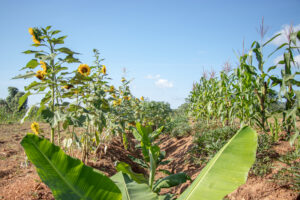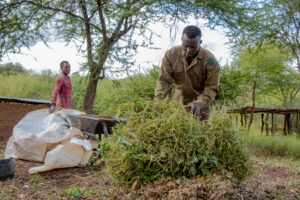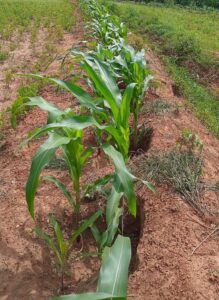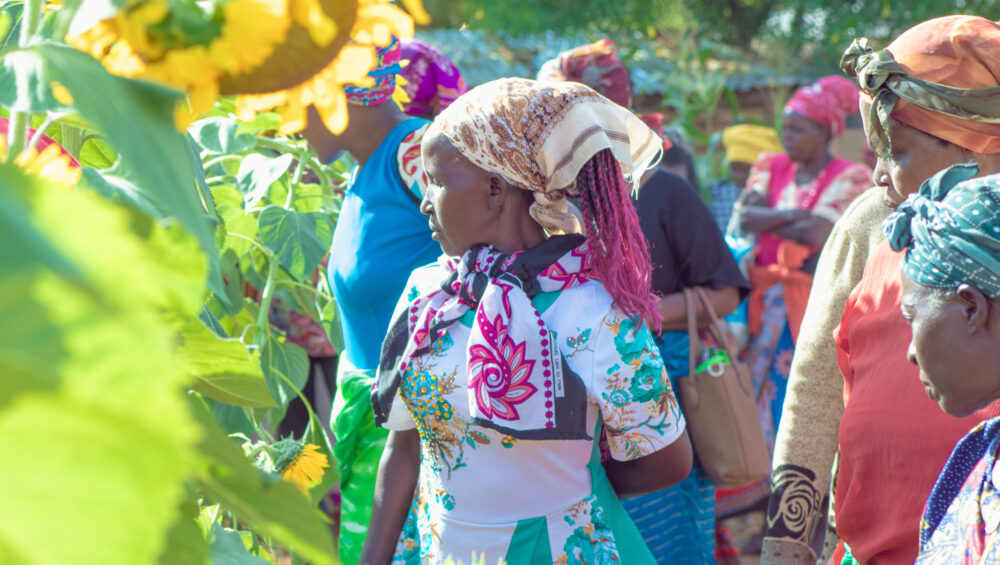Climate change and variability are disrupting agricultural production and food security in Kenya. Unpredictable rainfall patterns and prolonged droughts reduce crop yields and increase post-harvest losses and crop failure. According to WFP (2023), post-harvest losses account for 40% of harvested crops, leading to financial losses of up to USD 500 million. These challenges and negative impacts affect smallholder farmers the most, leaving them vulnerable to poverty, health issues, and food insecurity.
Furthermore, land degradation is both a driver and an impact of climate change and food security in Kenya. Nearly 80% of Kenya’s land mass is affected by land degradation, with 30 -40 % of the arid and semi-arid lands (ASALs) lost through degradation. Deforestation and soil erosion have impacted biodiversity and agricultural productivity. Urgent restoration efforts are needed to combat the risks of desertification.
Regenerative agriculture is a holistic approach to farming that aims to enhance soil health, preserve biodiversity, improve water retention, and increase agricultural output and profitability. Employing various methods designed to reverse the damage caused by conventional farming practices and climate change impacts.
This approach yields far-reaching economic, social, and environmental benefits. Serving as both a mitigation and an adaptation strategy, restoring land ecosystems and biodiversity while strengthening the resilience of our food systems.
Importantly, regenerative agriculture empowers smallholder farmers to better prepare for, adapt to, and recover from climate change impacts. It aligns food production with ecological balance and achieves this without compromising nature, making it a key pathway for sustainable development and climate resilience.
At Itanya Africa Group, we have turned these principles through our “Resilience Through Regeneration Project” . We apply various regenerative principles and practices;
- Syntropic Agroforestry helps farmers work with nature by emulating how plants grow in forests over time. Each plant is placed where and when it grows best. Instead of relying on chemicals or heavy inputs, it uses natural processes to improve the land. The harvest is a natural result of restoring the health of the ecosystem.
At our Demo Farm in Wamunyu, Machakos County, we apply syntropic agroforestry by planting a variety of tree (fruit and flowering) species and food crops and herbs as follows:
- Fruit trees; Pawpaw, Apple,Lemon,Pixie, Avocado and Pomegranate.
- Tree species and flowering plants; Croton megalocarpus, Casuarina, Markhamia lutea, Senna siamea and Grivellia robusta.
- Food crops and herbs; yellow beans, green grams,maize,sunflower, and bananas.
This approach has stimulated the biodiversity of our local ecosystem and improved both yields and variety of our outputs.

Syntropic agroforestry demonstration at the demo farm showcases how integrating diverse crops can regenerate degraded land and increase productivity.
2. Composting – We recycle organic materials such as farm waste, grass, tree trimmings, and food scraps to create nutrient-rich organic fertilizers for use on the farm. This practice not only helps us grow organic food and reduce farming costs, but it also serves as a sustainable waste management strategy.

A composting lesson with the farmers at IAG’s demo farm
3. Minimum Tillage – We apply several strategies at the farm to minimize soil disturbance, preserve soil structure, retain moisture, and protect beneficial soil organisms. These include farm zoning (creating walking paths to reduce soil compaction), zaipits, and mulching.

zaipits—small planting pits designed to retain water and compost in drylands
Regenerative farming provides efficient solutions to the interconnected crises of climate change, land degradation, and food insecurity. By adopting these nature-positive methods, smallholder farmers can restore soil health, enhance biodiversity, and secure a resilient and sustainable food future.
At Itanya Africa Group, we are dedicated to walking alongside smallholder farmers on this journey. We offer practical solutions, knowledge, and support to transform food production. We believe that regenerative agriculture has the potential to revolutionize Kenya’s socio-economic landscape and uplift the livelihoods of millions of smallholder farmers.
Join us in creating a climate-resilient and thriving future for people and the planet.

